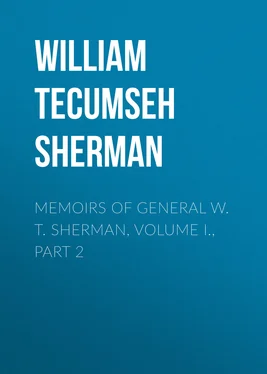William Tecumseh Sherman - Memoirs of General W. T. Sherman, Volume I., Part 2
Здесь есть возможность читать онлайн «William Tecumseh Sherman - Memoirs of General W. T. Sherman, Volume I., Part 2» — ознакомительный отрывок электронной книги совершенно бесплатно, а после прочтения отрывка купить полную версию. В некоторых случаях можно слушать аудио, скачать через торрент в формате fb2 и присутствует краткое содержание. Жанр: Биографии и Мемуары, История, foreign_edu, foreign_antique, foreign_prose, на английском языке. Описание произведения, (предисловие) а так же отзывы посетителей доступны на портале библиотеки ЛибКат.
- Название:Memoirs of General W. T. Sherman, Volume I., Part 2
- Автор:
- Жанр:
- Год:неизвестен
- ISBN:нет данных
- Рейтинг книги:3 / 5. Голосов: 1
-
Избранное:Добавить в избранное
- Отзывы:
-
Ваша оценка:
- 60
- 1
- 2
- 3
- 4
- 5
Memoirs of General W. T. Sherman, Volume I., Part 2: краткое содержание, описание и аннотация
Предлагаем к чтению аннотацию, описание, краткое содержание или предисловие (зависит от того, что написал сам автор книги «Memoirs of General W. T. Sherman, Volume I., Part 2»). Если вы не нашли необходимую информацию о книге — напишите в комментариях, мы постараемся отыскать её.
Memoirs of General W. T. Sherman, Volume I., Part 2 — читать онлайн ознакомительный отрывок
Ниже представлен текст книги, разбитый по страницам. Система сохранения места последней прочитанной страницы, позволяет с удобством читать онлайн бесплатно книгу «Memoirs of General W. T. Sherman, Volume I., Part 2», без необходимости каждый раз заново искать на чём Вы остановились. Поставьте закладку, и сможете в любой момент перейти на страницу, на которой закончили чтение.
Интервал:
Закладка:
In due season, about July 15th, our division moved forward leaving our camps standing; Keyes's brigade in the lead, then Schenck's, then mine, and Richardson's last. We marched via Vienna, Germantown, and Centreville, where all the army, composed of five divisions, seemed to converge. The march demonstrated little save the general laxity of discipline; for with all my personal efforts I could not prevent the men from straggling for water, blackberries, or any thing on the way they fancied.
At Centreville, on the 18th, Richardson's brigade was sent by General Tyler to reconnoitre Blackburn's Ford across Bull Run, and he found it strongly guarded. From our camp, at Centreville, we heard the cannonading, and then a sharp musketry-fire. I received orders from General Tyler to send forward Ayres's battery, and very soon after another order came for me to advance with my whole brigade. We marched the three miles at the double-quick, arrived in time to relieve Richardson's brigade, which was just drawing back from the ford, worsted, and stood for half an hour or so under a fire of artillery, which killed four or five of my men. General Tyler was there in person, giving directions, and soon after he ordered us all back to our camp in Centreville. This reconnoissance had developed a strong force, and had been made without the orders of General McDowell; however, it satisfied us that the enemy was in force on the other side of Bull Run, and had no intention to leave without a serious battle. We lay in camp at Centreville all of the 19th and 20th, and during that night began the movement which resulted in the battle of Bull Run, on July 21st. Of this so much has been written that more would be superfluous; and the reports of the opposing commanders, McDowell and Johnston, are fair and correct. It is now generally admitted that it was one of the best-planned battles of the war, but one of the worst-fought. Our men had been told so often at home that all they had to do was to make a bold appearance, and the rebels would run; and nearly all of us for the first time then heard the sound of cannon and muskets in anger, and saw the bloody scenes common to all battles, with which we were soon to be familiar. We had good organization, good men, but no cohesion, no real discipline, no respect for authority, no real knowledge of war. Both armies were fairly defeated, and, whichever had stood fast, the other would have run. Though the North was overwhelmed with mortification and shame, the South really had not much to boast of, for in the three or four hours of fighting their organization was so broken up that they did not and could not follow our army, when it was known to be in a state of disgraceful and causeless flight. It is easy to criticise a battle after it is over, but all now admit that none others, equally raw in war, could have done better than we did at Bull Run; and the lesson of that battle should not be lost on a people like ours.
I insert my official report, as a condensed statement of my share in the battle:
HEADQUARTERS THIRD BRIGADE, FIRST DIVISION
FORT CORCORAN, July 25, 1861
To Captain A. BAIRD, Assistant Adjutant-General, First Division (General Tyler's).
Sir: I have the honor to submit this my report of the operations of my brigade during the action of the 21st instant. The brigade is composed of the Thirteenth New York Volunteers, Colonel Quinby's Sixty-ninth New York, Colonel Corcoran; Seventy-ninth New York, Colonel Cameron; Second Wisconsin, Lieutenant-Colonel Peck; and Company E, Third Artillery, under command of Captain R. B. Ayres, Fifth Artillery.
We left our camp near Centreville, pursuant to orders, at half-past 2 A. M., taking place in your column, next to the brigade of General Schenck, and proceeded as far as the halt, before the enemy's position, near the stone bridge across Bull Run. Here the brigade was deployed in line along the skirt of timber to the right of the Warrenton road, and remained quietly in position till after 10 a.m. The enemy remained very quiet, but about that time we saw a rebel regiment leave its cover in our front, and proceed in double-quick time on the road toward Sudley Springs, by which we knew the columns of Colonels Hunter and Heintzelman were approaching. About the same time we observed in motion a large mass of the enemy, below and on the other side of the stone bridge. I directed Captain Ayres to take position with his battery near our right, and to open fire on this mass; but you had previously detached the two rifle-guns belonging to this battery, and, finding that the smooth-bore guns did not reach the enemy's position, we ceased firing, and I sent a request that you would send to me the thirty-pounder rifle-gun attached to Captain Carlisle's battery. At the same time I shifted the New York Sixty-ninth to the extreme right of the brigade. Thus we remained till we heard the musketry-fire across Bull Run, showing that the head of Colonel Hunter's column was engaged. This firing was brisk, and showed that Hunter was driving before him the enemy, till about noon, when it became certain the enemy had come to a stand, and that our forces on the other side of Bull Run were all engaged, artillery and infantry.
Here you sent me the order to cross over with the whole brigade, to the assistance of Colonel Hunter. Early in the day, when reconnoitring the ground, I had seen a horseman descend from a bluff in our front, cross the stream, and show himself in the open field on this aide; and, inferring that we could cross over at the same point, I sent forward a company as skirmishers, and followed with the whole brigade, the New York Sixty-ninth leading.
We found no difficulty in crossing over, and met with no opposition in ascending the steep bluff opposite with our infantry, but it was impassable to the artillery, and I sent word back to Captain Ayres to follow if possible, otherwise to use his discretion. Captain Ayres did not cross Bull Run, but remained on that side, with the rest of your division. His report herewith describes his operations during the remainder of the day. Advancing slowly and cautiously with the head of the column, to give time for the regiments in succession to close up their ranks, we first encountered a party of the enemy retreating along a cluster of pines; Lieutenant-Colonel Haggerty, of the Sixty-ninth, without orders, rode out alone, and endeavored to intercept their retreat. One of the enemy, in full view, at short range, shot Haggerty, and he fell dead from his horse. The Sixty-ninth opened fire on this party, which was returned; but, determined to effect our junction with Hunter's division, I ordered this fire to cease, and we proceeded with caution toward the field where we then plainly saw our forces engaged. Displaying our colors conspicuously at the head of our column, we succeeded in attracting the attention of our friends, and soon formed the brigade in rear of Colonel Porter's. Here I learned that Colonel Hunter was disabled by a severe wound, and that General McDowell was on the field. I sought him out, and received his orders to join in pursuit of the enemy, who was falling back to the left of the road by which the army had approached from Sudley Springs. Placing Colonel Quinby's regiment of rifles in front, in column, by division, I directed the other regiments to follow in line of battle, in the order of the Wisconsin Second, New York Seventy-ninth, and New York Sixty-ninth. Quinby's regiment advanced steadily down the hill and up the ridge, from which he opened fire upon the enemy, who had made another stand on ground very favorable to him, and the regiment continued advancing as the enemy gave way, till the head of the column reached the point near which Rickett's battery was so severely cut up. The other regiments descended the hill in line of battle, under a severe cannonade; and, the ground affording comparative shelter from the enemy's artillery, they changed direction, by the right flank, and followed the road before mentioned. At the point where this road crosses the ridge to our left front, the ground was swept by a most severe fire of artillery, rifles, and musketry, and we saw, in succession, several regiments driven from it; among them the Zouaves and battalion of marines. Before reaching the crest of this hill, the roadway was worn deep enough to afford shelter, and I kept the several regiments in it as long as possible; but when the Wisconsin Second was abreast of the enemy, by order of Major Wadsworth, of General McDowell's staff, I ordered it to leave the roadway, by the left flank, and to attack the enemy.
Читать дальшеИнтервал:
Закладка:
Похожие книги на «Memoirs of General W. T. Sherman, Volume I., Part 2»
Представляем Вашему вниманию похожие книги на «Memoirs of General W. T. Sherman, Volume I., Part 2» списком для выбора. Мы отобрали схожую по названию и смыслу литературу в надежде предоставить читателям больше вариантов отыскать новые, интересные, ещё непрочитанные произведения.
Обсуждение, отзывы о книге «Memoirs of General W. T. Sherman, Volume I., Part 2» и просто собственные мнения читателей. Оставьте ваши комментарии, напишите, что Вы думаете о произведении, его смысле или главных героях. Укажите что конкретно понравилось, а что нет, и почему Вы так считаете.












